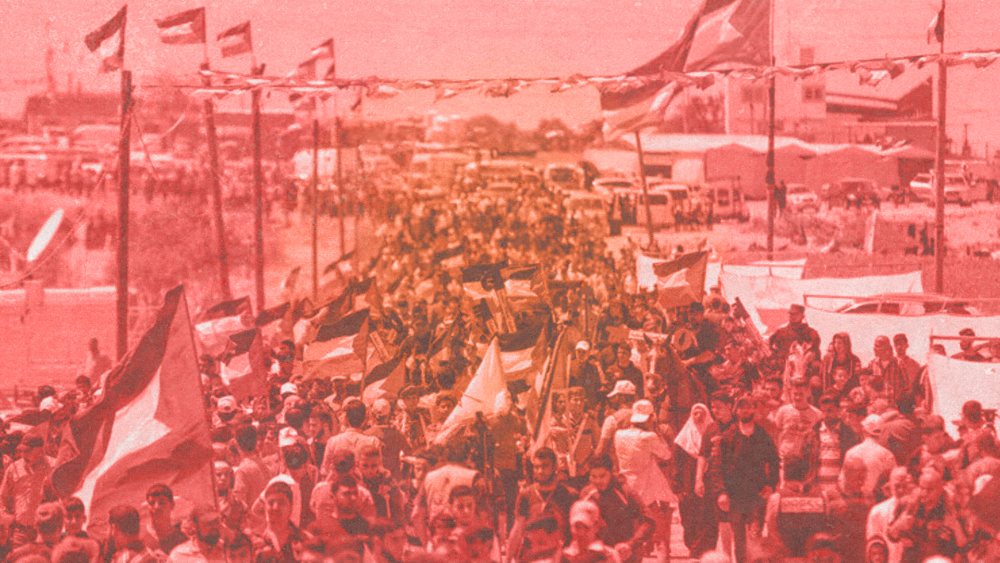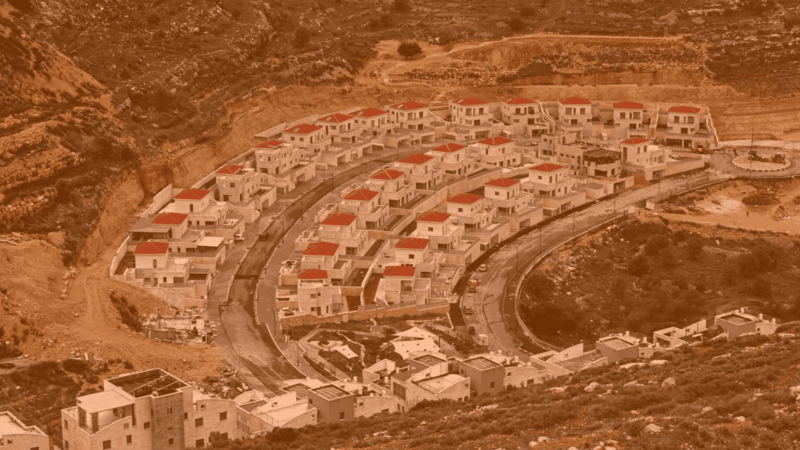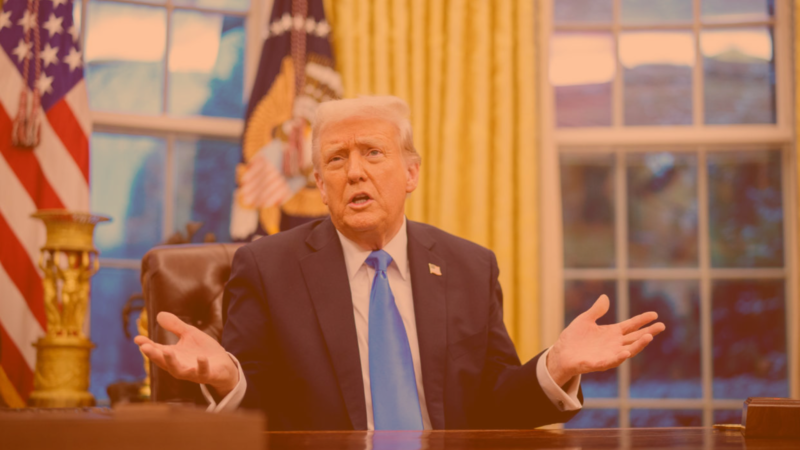As we commemorate the 75th year of the Nakba, so do we commemorate the Palestinian people’s 75th year of resistance, in all its forms, not the least of which is cultural resistance. In a bid to reclaim a truthful and accurate narrative, the One Democratic State Initiative presents the following examination of key expressions and concepts that are often used in the Palestinian liberation discourse.
The Israeli-Palestinian Conflict
Speaking of a “conflict” between two sides implies that they are of comparable strengths or claims to legitimacy. The reality is that colonisers, supported by world powers, ethnically cleansed a land in order to supplant the native population, to eventually become a nuclear power faced with rudimentary rockets. Instead of speaking of an Israeli-Palestinian conflict, let us call a cat a cat and speak of Israeli occupation and settler-colonisation of Palestine.
The Occupation
The “occupation” is often linked to the Israeli theft of Palestinian land and homes. However, real estate theft, although a crime, does not in itself constitute occupation. To give an example, French citizens attacking and appropriating Canadian homes would be criminals, perhaps mafiosos, but not occupiers. That would change, however, the moment they declare that the territory belongs to the French and not to the Canadians. What makes occupiers occupiers is the identarian political project they hold for a state exclusive to them (and exclusive of natives). It follows that the return of Palestinian refugees and their recuperation of their homes, although essential to liberation, would not constitute liberation—It is only the transition from the state exclusive to Jews to a state of all its citizens that would. Discussing the occupation should thus primarily focus on the Zionist political project for an exclusionary settler-colonial state rather than solely to their crime of physical appropriation of Palestinian houses.
Israel and the Occupied Palestinian Territories
The United Nations recognise the lands robbed(to use Ben Gurion’s terms) in 1948 to be “Israel” while those robbed in 1967 to be “the occupied Palestinian territories”. Nobody is, however, bound by this colonial body’s decisions. Although we recognise the existence of the state of Israel, we do not recognise its legitimacy as a settler-colonial state. We do not, therefore, refer to any Palestinian land as “Israel”.
Liberation
The Palestinian National Charter defined “liberation” by defining the borders of Palestine, refusing its partition and recognising its Jewish non-settler residents as full Palestinian citizens. Palestinian leadership, prior to the Nakba and up until the Palestinian Liberation Organisation, all adopted similar “One Democratic State” solutions, only to forego this vision for liberation in favor of the two-state proposal, starting with the 10-point program and leading to the Madrid Conference, Oslo accords and others, which was then followed by increasing calls for “throwing the Jews in the sea”—all in the name of “liberation”. Hence the need to return to the historic Palestinian vision for liberation, that of One Democratic State, the establishment of which liberates the land and entails dismantling the colonial-apartheid entity called Israel and liberate society by democratising it. Such a clear political vision would prevent conflating “liberation” with either normalising or racist enterprises.
The Two-State Solution
The two-state proposal was never a viable solution (much less a just one). First, because Israel never intended to grant Palestinians a state, in line with the Zionist “Greater Israel” project. More importantly, however, because the two-state proposal relies upon the premise that identity should be politicised: Since Arabs and Jews exist on this land, the land should be partitioned to allow for the establishment of a state for Arabs and another for Jews. This reproduces the colonial model that views states, not as apparatuses to administer the affairs of society in a certain territory, but as aggressive machines in the hands of a certain identity against others. The danger of this political vision can be seen in the implications of the establishment of two identitarian states: Cementing the injustice of occupation, dispossession and colonisation, further fragmenting society into two groups, institutionalising this enmity as opposed resolving it by means of a non-segregative democratic state, a denial of the right of return (why would Arabs return to a Jewish state? Let them return to “their” state), and a door wide open for further ethnic cleansing of Arabs from the Jewish state (why would Arabs remain in a Jewish state? Let them go to “their” state). For all these reasons, let us refrain from speaking of two states as a solution.
Independence
The word “independent” begs the question: independent from what? Although it would be perfectly appropriate in the context of an indigenous people struggling against an occupying foreign power, such as Algerian independence from France for example, it makes less sense in the context of Palestine where a foreign population created their state by brutal force on the land of Palestine itself. The Palestinian struggle is therefore not for independence from Israel but a contestation of the very legitimacy of a state exclusive to some. Referring to the kind of state (secular and democratic rather than Jewish and Zionist) and to its borders (from the river to the sea) therefore more accurately reflects the reality of the Palestinian struggle for liberation and decolonisation.
Apartheid
Apartheid refers to segregation within a society. The Zionist settler-colonial endeavor, however, does not merely discriminate between populations under its control but seeks to supplant the indigenous Palestinian society and replace it with another. This is not merely a past endeavor as exemplified during the Nakba but a present one, of which its decision to automatically grant citizenship to any Jew in the world while denying the indigenous people their right to return to their land are two manifestations. While it is definitely correct to describe Israel as an apartheid state, it would not be accurate to define it merely as such.
Right to Self-Determination
The “right to self-determination” is a legal term that refers to the right of a people to determine its own destiny free of foreign hegemony. The Palestinian people’s right to self-determination was trampled when the United Kingdom, supporting the Zionist movement, effected the mass migration of non-Palestinians to Palestine without a democratic mandate from the Palestinian people. The creation and the continued existence of the apartheid settler-colonial state of Israel, enabled by major colonial powers of both the East and the West, means that this trampling is ongoing. However, approaching the issue from the legal “right to self-determination” perspective is far from ideal. International legal decisions depend, not on objective values of right and wrong, but on the power balance between the major powers, and can easily be skewed. To give just one example, there currently are conflicting definitions and legal criteria for determining which groups may legitimately claim the right to self-determination. It would be legally possible for world powers to decide that “the Jews” constitute a people with the right to self-determination and to grant them natives’ land on this basis. The correct framework to the colonisation of Palestine is therefore that of justice rather than legalism. A just solution is based on the values of equality and democracy, which can only be guaranteed by One Democratic State of all its citizens, irrespective of their religious, ethnic, cultural or other identity.
Antisemitism
The European expression “antisemitism” is not free of misconceptions. First, it relies on the Abrahamic story of Sem, son of Noah. Although Jews, Christians and Muslims are fully entitled to their religious beliefs regarding the historicity of these individuals, such religious beliefs cannot form the basis for universal concepts. Second, it relies on the Zionist claim that all Jews are children of Sem, which, even if we were to believe in Sem, stands in stark dissonance with Jewish people’s genetic, multiethnic reality and in blatant disregard of Jewish converts’ various ethnic origins. Racism or hatred against Jews, in the West or elsewhere, may be spoken of as what they really are, racism or hatred against Jews, without having to resort to unproven or disproven claims.
Israeli Arabs or 1948 Arabs
Such expressions deliberately omit any reference to the fact that the survivors of the 1948 ethnic cleansing are Palestinians, which rids them of their Palestinian identity, fragment them from their society, and presents them as an “ethnic minority in Israel” rather than native Palestinians. Proper expressions would, on the other hand, clearly reference them as 1948 Palestinians, Palestinians inside the green line, Palestinians holding Israeli citizenship.
“Arabs vs. Jews” and other identitarian terminologies
Political discourses regarding Palestine often invoke an “Arab vs. Jews” narrative. This ethnoreligious portrayal is, however, inaccurate. On the one hand, Jews have been an organic part of the indigenous Palestinian people for centuries, even millennia. On the other hand, the Mizrahim are Arabs, yet are occupiers. The issue, at its core, has nothing to do with religion, ethnicity, culture or any other kind of identity. Portraying the colonisation of Palestine as a religious war or a “clash of civilisations” serves to justify Zionism’s identitarian claims, and obscures reality: An alien population chose to be settlers rather than migrants by choosing to supplant the indigenous society instead of integrating itself into it. It is this political choice that is at the root of an unending cycle of injustice and violence; a cycle that can only be ended by the defeat of the settler-colonial enterprise by means of the establishment of One Democratic State, from the river to the sea.
In conclusion: The above is not meant to serve as a mental exercise, but rather as a call to reclaim the narrative for liberation and decolonisation. A careful examination of the key expressions and concepts can help form a sound, solid narrative that overpowers and neutralises Zionist hasbara, convinces the reluctant, rallies onlookers to our cause and helps us close ranks around a political project for One Democratic State, from the river to the sea. We call on Palestinians and allies to engage, with the ODS Initiative and among each other, in thoughtful and careful consideration of our proposal for this political vision to accompany, even guide, our efforts for liberation and decolonisation.
The One Democratic State Initiative
Do you want to be informed of DiEM25's actions? Sign up here















